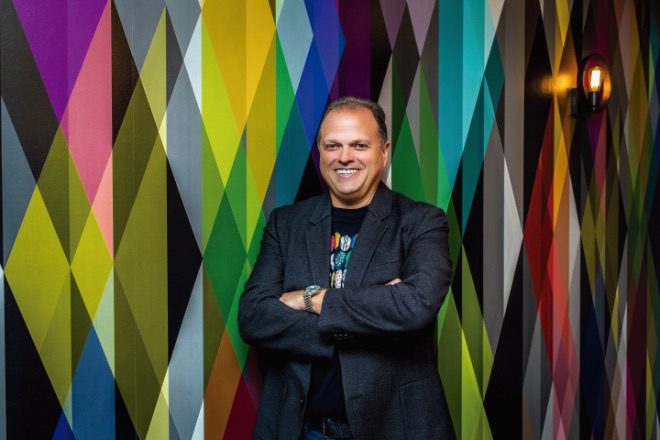Paul Esherwood Interviews Mike Ettling
Mike Ettling takes over at Unit4 and talks exclusively to ERP Today about the driving force behind the people agenda and what it takes to be a successful CEO in the fast-paced world of ERP and HCM technology.
Mike Ettling is a South African entrepreneur and the new CEO of Unit4. He is the former President of SAP SuccessFactors and has a long track record of leading people-focussed businesses. In his early career he utilised emerging technologies to launch several companies by replicating existing models and using technology to do things more efficiently. He was at the forefront of the BPO era in the 80s and managed large parts of EDS’s (Electronic Data Systems – now DXC Technologies) business in the 90s. He has been involved with HR and payroll organisations for two decades, and since leaving SuccessFactors, has had a strong relationship with Advent International, the private equity company which owns Unit4. I spoke to Ettling on his first day in the job at the Ambassador’s Connect event and then caught up with him 100 days later to see what he had achieved so far and how he intended to put ‘some sizzle on the Unit4 steak’.
“Everything is pretty much as I expected”, said Ettling, when asked how his first 100 days in the job had gone. “Most things are better with just a couple of things that I’ve already identified we need to improve.”
I’m keen to find out what those things are, particularly the ones that need the most attention, but I also want to understand more about Ettling’s journey and what has led him to the top job at Unit4. I said in the introduction to this article that Ettling was an entrepreneur; and that statement is important. You see, Ettling has started businesses from scratch. He’s run small companies. He’s grown some of them into big companies. He’s been involved with acquisitions and mergers. He’s invested his own cash in start-ups, and he has sweated over paying the bills several times. You can’t really succeed as an entrepreneur unless you’ve had to worry about how everyone is going to get paid, and you can’t really succeed in growing a private equity backed business if you don’t have the entrepreneurial flair to bet ahead of the curve, spot the opportunities and carve out a niche.
Early career
Ettling’s career began while he was still a student at university. He started a marketing business selling discounted magazine subscriptions to students and although the business wasn’t technology related, Ettling says he always looked for the tech angle, even in those early days.
“My father was in newspapers and publishing so I decided to try and get into that. There were lots of similar businesses in Europe doing the same thing but I managed to build my company using Novell networks (an up and coming technology that eventually surpassed mainframe computing) and managed to build a sizeable business with a fraction of the people my European equivalents needed.”
Ettling was backed in his first business by none other than Time Inc. (now WarnerMedia) and says the business flourished to a point where he needed to make a decision whether to continue his accounting career or put all of his efforts into being an entrepreneur.
“I was studying to be an accountant and did an exchange with KPMG in New York for a few months. I really got a taste for the financial markets and when I came back to South Africa I got involved with setting up the first Future’s Exchange and I built a new clearing system for KPMG to manage risk. I became an expert in financial instruments, but again it all came back to technology. I still have McCracken’s Guides to Fortran and Cobalt on my book shelf and having that underlying knowledge really teaches you the logic and how to ask the right questions in software. The problem came after I had qualified at KPMG. I was officially moonlighting with my own business and eventually my boss said it was time for me to make a decision – I chose to go the entrepreneurial route.”
Ettling left KPMG to focus on his marketing company and shortly after, separated the business into two. He says that one part of the business ultimately failed which was a pretty good learning experience, but the other, which diversified into publishing magazines, radio media and on-campus promotions, flourished and is still going strong in South African today.
Ettling’s next move was to build a fulfilment company which he modelled on the US business, Neodata. Through a mixture of good and bad fortune, Ettling’s business was sold to one of the publisher-investors, but it had caught the attention of Neodata – the business he had mimicked – and before long Ettling was invited to demonstrate some of the technology he had been building.
“The fulfilment business didn’t really work out as I had hoped. The whole culture in South Africa around outsourcing hadn’t really developed, IBM and EDS had not gone back into the market and sanctions were still in place. We had built this technology to run fulfilment on Microsoft SQL Server with Delphi as the development tool – this was early client server days, when everyone was still building on Mainframes – I got a call from the CEO at Neodata and was asked to show them the software. One thing led to another and I was asked to join Neodata to run all their technology in the UK. In February 1997 I came to the UK with my then-girlfriend to run it for them. That led to another great opportunity when Neodata bought a business that was one of the first loyalty scheme ventures. They were trying to sell a new concept called ‘enterprise customer management’ and eventually EDS picked up on this and thought it was going to be huge. They bought Neodata and rolled it into a larger organisation with all their call centre and database businesses. This was the first global CRM play and was the way I got into EDS where I spent many years running big chunks of their BPO business.”
After five years with EDS, Ettling made his first private equity move with Synstar, an IT services business, which was involved in break-fix maintenance and business recovery systems. He ran the business as CEO for the UK, Ireland and Germany until HP bought it in 2004. A short run in Australia was followed by a spell in Asia before returning to the UK to manage global BPO for Unisys. However, it was Ettling’s next move which put him on the HR and people focussed trajectory – he joined NGA and says this was the first time he encountered the different dynamics of selling to people leaders rather than IT leaders.
“I’m now dealing with the CHRO for the first time having spent all my career selling to the CIO – and they buy very differently. The first dinner I went to within this circle lasted for five hours and everyone was talking about the people experience and how’s this going to affect my employees. I’d never had those conversations with CIOs and it really highlighted the difference in buying and thinking.”
After leaving NGA in 2013, Ettling spent a year doing private equity advisory work before finding himself at SuccessFactors where he spent the next four years. Some more advisory work and angel investing kept Ettling busy until his relationship with Advent took a different direction. Advent had been trying to sell Unit4 for 12 months and hadn’t managed to get the deal away so they asked Ettling to join as CEO, and the rest as they say, is history.
Why am I telling you all this?
Well to understand how good Ettling is going to be, or not, at running an ambitious mid-market ERP company, it’s important to get under the skin and find out what makes the man tick. His background is eclectic. He has been a founder, investor, manager, director, CEO and president of many companies – not all in the ERP space and certainly not all $500m businesses with ambitions to double that. But there are three themes that run through every one of Ettling’s previous roles. Entrepreneurship, people, and technology
.
Entrepreneurship
To be successful in the very fast paced world of enterprise apps, where product lifecycles are short and the next app or platform that is going to blow your product out of the water is always just around the corner; you need to be an entrepreneur. You need to be able to cut through the hype, assess the market and make your play before anyone else does. Or at least make your play where nobody else does. This spirit of entrepreneurship is something that Ettling holds dear and cites it as an invaluable tool for all business leaders. He remembers a time from his very early business ventures when he would look at a big white board with all the sales and cash collections and wonder if he was going to be able to pay everyone.
“Unless you’ve sweated a payroll you really don’t know what it’s like to run a business. You’ve got to learn to look at the business from the eyes of the entrepreneur. I think it brings value to a person as a CEO and I would encourage my leaders to take non-exec positions because it enables you to develop a different lens to look at the business.”
Ettling also points to his work in private equity advisory, and his own investments, as being key ingredients in the mix for successful business leadership and says that he has introduced some of the ideas that he has seen into the Unit4 culture already.
“I was heavily involved, almost full time, with a private equity fund helping them with their tech investments and doing some angel investments myself in the HR tech space. I was looking at opportunities where I felt I could add more than just money and also where I thought the majors were unlikely to get involved. A lot of the best technologies in this space are coming out of start-ups and being invested in them has given me a great insight into the minds of the modern entrepreneur and the way they are all so people orientated. I bring a lot of what I’ve learned over the years into the way I lead a business today. One example is that we involve our brightest young professionals in senior management meetings. It’s a great way to get a different perspective on things and something that we really believe in at Unit4.”
So, can you be an entrepreneur and a CEO? Ettling told me that being around so many interesting start-ups had reignited his desire to lead a business again but I was unsure whether Unit4 was going to satisfy his entrepreneurial needs.
“I wanted to get back in the saddle but that wasn’t about starting up a new company or being an entrepreneur again. Getting back in the saddle was about building a team, engaging people and creating a purpose both in the market and with your people. If you get that right, it’s like the wind in your sails. Entrepreneurship in a $500m business like Unit4 is different to a start-up. You’ve got to choreograph things differently and think about how it all fits together. You can still drive the principles of entrepreneurship, but you have to do it in a more holistic way. One of the big reasons people leave start-ups is that the founders have so many ideas that the other people in the business can’t keep up with a new idea every day. We’ve got lots of ideas at Unit4 but I’m a big believer that people can only really deal with three things at any one point in time. Let’s do three, let’s do them well, and then we can do another three.”
People Platform
Since ERP platforms were first developed it has been the user experience that has largely weighed them down. They have been systems of record; the record creation, record keeping and analysis have been more important than the usability of the overall process. Many ERP systems still make their users suffer from that legacy because it is hard to overcome the underlying concepts of ERP design and architecture. Effectively, only platform and functionality innovation can address the usability challenge that ERP users face. And Unit4 has put a lot of time, money and effort addressing these issues.
More importantly, Unit4 is also addressing people productivity with a more holistic approach than just user experience – that is, with people experience. Traditionally, user experience has been narrowed down to the experience of a user of a system. Given the layered and multisystem nature of ERP, and the addition of often acquired systems thrown into the mix, the ERP user experience has been fragmented and incongruent at best. Unit4 is aiming at a consistent and holistic user experience across the company’s solutions, focused on people productivity. That means that integration to other key people applications (Microsoft Office, for example) needs to be enabled because users spend time in the ERP and document applications. Specific areas where the People Platform wins out are;
Loosely coupled integration. To enable ‘mesh-ups’ of business capabilities at the speed that service industries need, Unit4’s People Platform allows for loosely coupled integration via REST-based APIs. This allows the automation of business needs on a faster and more agile basis, ultimately enabling a better people experience.
Dynamic data interoperability. Being able to exchange and interoperate on data without having to move it across systems is a key factor for faster and better insights. Instead of having to wait for IT resources to move and prep data, Unit4 users can bring the data together when they need to answer their business questions.
Ontology business object taxonomy. What sounds like a boring technology topic is the enabler for Unit4 users to achieve a better people experience. People in service industries must combine capabilities in a dynamic way, and a common taxonomy of business objects is needed so that their systems can speak to each other.
Message hub. Modern architectures scale through messages and achieve their agility through a low-latency but asynchronous messaging architecture. Being able to integrate and communicate via a messaging hub makes applications and integration using the Unit4 People Platform easier to integrate.
Technology
I asked Ettling at the very start of this interview what he had discovered in his first 100 days and he told me the most encouraging bits that exceeded his expectations were all to do with the product. I won’t go into too much detail on the Unit4 platform and applications here as we will be covering this extensively in the next issue of ERP Today. However, it is worth noting that the Unit4 platform, architecture and application stack is one of the most complete and genuine cloud propositions on the market. Its platform moved to Azure in 2016 and has been enhanced with a range of ‘experience improving’ features built on its microservices architecture. Features like the Extension Kit allow smoother integrations with other software and applications. Its Smart Automation Service manages repetitive and low-value tasks like service orders and invoice processing, improving the experience for uses who are now able to migrate to more meaningful, high-value activities. And its interactive chatbot, Wanda, is one of the first to be offered to customers as part of the broader offering. When it works, it is able to answer questions, provide data, make notes, schedule meetings, record absence, make request and provide a unique interface into the ERP system. This gives users a taste of the technology experience many have already started to take for granted in their personal lives.
In conclusion
Ettling has a wealth of experience in the HCM and enterprise apps sector, coupled with a deep understanding of technology, and more importantly, how that technology can be made to work for people. Considering how advanced the Unit4 platform, architecture and application stack is, it is somewhat surprising that more noise has not been made about it. Ettling says he is addressing the marketing issue with the appointment of a new CMO where the brief will be to “put some sizzle on the steak.” The ERP mid-market is ripe and its where the highest volume of opportunities are. It’s unlikely that Unit4 will be pitching against Oracle and Workday any time soon, but that’s fine – there is enough business in the mid-market for them to achieve their ambitions of doubling in size without having to think about fishing in a new pond. The Unit4 student management suite (again this will be covered in the next issue) is potentially a market leading product and Ettling says their first 25 customers are in various stages of going live. This could be a very interesting addition to the portfolio as many of the main HCM vendors (who offer student management) are unlikely to have products as functionally rich as the Unit4 offering. Ettling’s biggest challenge will be to find a way to capitalise on the excellent work already done on the platform and make sure customers know about it before the other vendors catch up.




